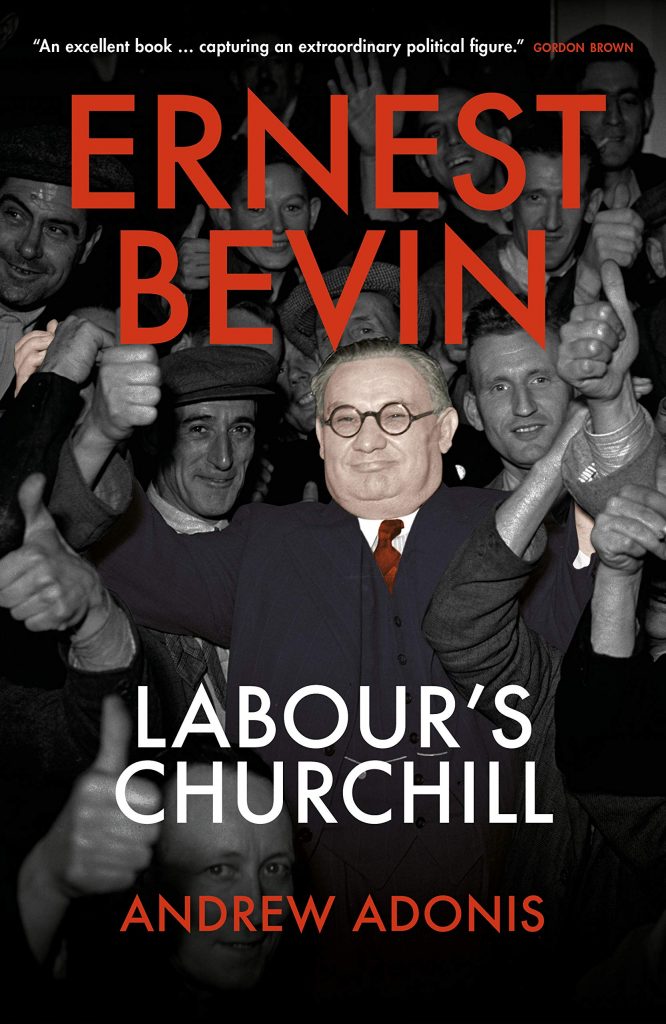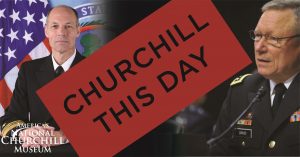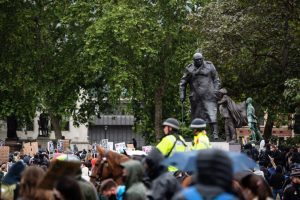
Bulletin #146 – Aug 2020
The Bristol Giant

August 1, 2020
Andrew Adonis, Ernest Bevin: Labour’s Churchill, Biteback Publishing, 2020, 357 pages, £20.00. ISBN 978–1785905988
Review by KENNETH O. MORGAN
Ernest Bevin and Winston Churchill were (alongside David Lloyd George) the three titans of twentieth-century British politics. Bevin and Churchill were an astonishing contrast: Churchill was born in Blenheim Palace and educated in Harrow and Sandhurst; Bevin was a seriously disadvantaged orphan, who began life as an eleven-year-old farm labourer, was part-educated in the Baptist Sunday School and local adult education classes, and, as he liked to say, the “’edgerows of experience.” But he made his way with astonishing speed amongst the dockers of Bristol. He always had a great affection for the city. Lord Franks, who was a British ambassador to Washington, told me of the rapport he developed with Bevin through both being Bristolians.
Churchill himself had a Bristol Connection. He became, and remains, the longest-serving Chancellor of the city’s university. Today, the memories of Bevin and Churchill are permanently joined together at Churchill College, Cambridge, where Bevin’s papers form part of the Archives. Additionally, a bust of “Ernie” presides over the Bevin Room in the college library, an important reminder that Bevin was a leading member of Churchill’s wartime coalition. It was a long road from Bristol.
Bevin’s first triumph was in amalgamating the transport and dockyard workers into the mighty Transport and General Workers Union in 1922. This transformed British unions more generally by extending them to the unskilled masses, not just the skilled “aristocracy of labour.” Bevin’s supreme early test came in the nine-day general strike of May 1926. He disapproved of the confused leadership of the unions, especially that of the miners, but he fought for them on grounds of working-class solidarity. He also had his first clash with Churchill, then Chancellor, whom Prime Minister Baldwin used to edit the sabre-rattling British Gazette. The general strike met with total defeat, but it marked Bevin’s rise to power and greatness.
Thereafter, Bevin established a personal ascendancy over the trade union world. Taking part in industrial inquiries, he was superb. Before the Shaw inquiry on dockers’ wages, he showed how little food the wage provided for a docker’s family. In 1931, he joined forces with the great economist John Maynard Keynes on the Macmillan Committee in attacking the Bank of England’s reactionary stance on the gold standard, budget balancing, and devaluing the pound. When Churchill became prime minister during the war, he had the brilliant idea of making Bevin a kind of supremo on the home front at a much-expanded Ministry of Labour. “He was the Labour man I wanted most,” said Churchill. Bevin created a new system of corporately regulated capitalism, which lasted until the Thatcher years. His pro-union influence was everywhere, from catering for workers’ food, to factory entertainment for the workforce in the Entertainments National Service Association (ENSA) during the Second World War, to compulsory negotiation, and, crucially, long-term full employment. No more Wigan piers. Churchill credited him with a major role in the ultimate victory. As a wartime minister, Bevin laid the basis for a post-war welfare state and a planned economy—the road to 1945.

2025 International Churchill Conference
Before the war, Bevin had taken a close interest in foreign affairs, urging the nation to reject appeasement and stand up to the fascist dictators. His first task was to remove the pacifist George Lansbury, Jeremy Corbyn avant la lettre, from the party leadership, which he achieved with a brutal but accurate onslaught upon him at the 1935 party conference. Bevin’s relationship with the new leader, Clement Attlee, became the closest and deepest friendship of his career. Clem and Ernie, Haileybury school and the Transport Workers, were truly a dominant partnership, based on total trust.
When Attlee unexpectedly sent Bevin to the Foreign Office, it proved to be a masterstroke. There he got on well with somewhat patronising public-school FO mandarins. More important, he always kept close to his own working class—“my people.” Internationally, he confronted the ongoing crisis of the Cold War. He was a formidable cold warrior himself, with his lifelong hatred of communism bred in him as a union leader, and he was rightly determined to beat down sentimental leftish dreams that “left could speak to left.” With Stalin in command, there was every reason for Bevin’s view. And he had remarkable achievements: the complete remodelling of Germany after Potsdam and the creation of the Federal Republic in 1949; his careful work with George Marshall in creating the post-war Organization for European Economic Cooperation (OEEC) for the economic resurgence of western Europe (including Britain); launching NATO to ensure America’s long-term commitment to European defence (unlike the US isolationism of 1919); and the defence of West Berlin against the Soviet blockade in 1948–49. Bevin was central to each one of these diplomatic triumphs.
But, there were two huge blunders. In Palestine, Bevin left a shambles, as every British government had done since the 1917 Balfour Declaration. He mishandled attempts to create separate Jewish and Arab states, his views influenced by disputes with US Secretary of State James F. Byrnes, and, appallingly, by blatant anti-Semitism. The Middle East thus remains a bloody mess, whereas India was a success, thanks mainly to Attlee. Bevin, an apostle of western defence collaboration in the 1940s, turned fatally against the idea of European Union as presented in the Schuman Plan of 1950. Not only was he an old-fashioned Empire-Commonwealth man, he was also an opinionated Eurosceptic. It is sad that a great Foreign Secretary became the harbinger of Brexit. Elsewhere, he misguidedly urged the French to stay in Indo-China and the Dutch in Indonesia. He died before he could encourage the Americans in Vietnam.
Lord Adonis analyses all this with skill and grace; he reflects both historical scholarship and the shrewd current insight of a former minister. He had to cope with the scrappiness of the Bevin Papers, and his footnotes oddly show no apparent use of the National Archive at Kew. There are gaps—nothing on Bevin’s influence on the Attlee government at home (steel nationalisation or the NHS, for instance). And, like his subject, Adonis is sometimes less than fair to Bevin’s critics, notably Aneurin Bevan, founder of the NHS (whom Bevin, at his life’s end, backed in his row with Gaitskell over NHS cuts). But on all the big points Adonis is resoundingly correct. He has written a fine tribute to a great man—and a great Bristolian. If the local citizens wish to crown the empty plinth on the city’s post-Colston harbourside and find no appropriate black Briton, they could surely instal their working-class hero, the imperishable Ernie.
Kenneth O. Morgan’s books include studies of David Lloyd George, James Callaghan, and Michael Foot. He serves in the House of Lords as Baron Morgan of Aberdyfi and is a member of the International Churchill Society’s Board of Academic Advisers.
Subscribe
WANT MORE?
Get the Churchill Bulletin delivered to your inbox once a month.





